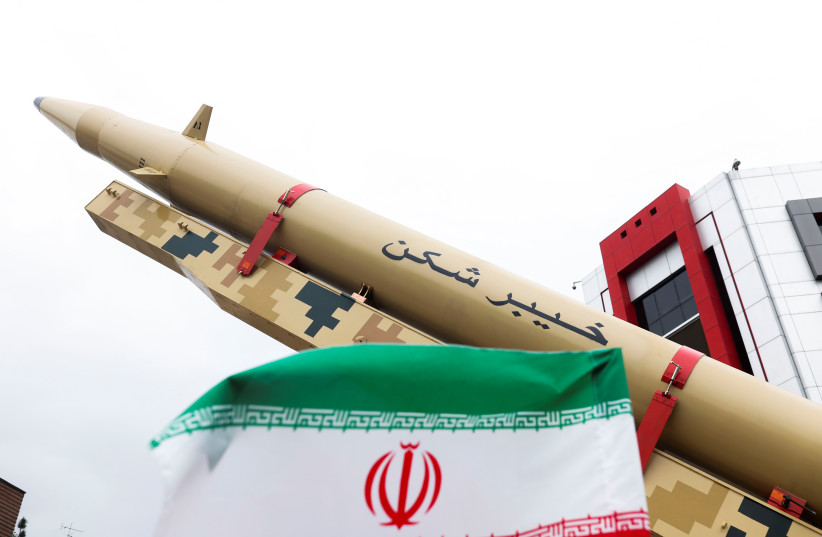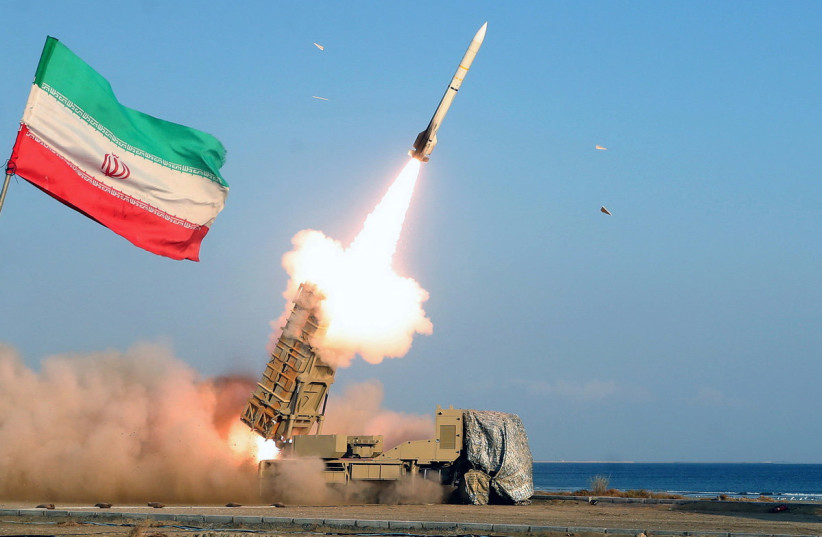Former Iranian diplomat Hadi Afghahi revealed many interesting details about Iran’s emerging consensus on what is going on in Israel and in Iran’s attempts to threaten Israel.

In one of the most interesting interviews in Iranian pro-regime media this week, the regime appeared to explain its overall view on the Middle East today, particularly in regard to Israel.
The interview was held with former Iranian diplomat Hadi Afghahi, who is frequently quoted in Iranian regime media and his views represent not only the regime’s views but also a kind of trial balloon for how the regime views the region. For instance, he recently praised the possibility of Turkey-Syria reconciliation and noted that Syria and Saudi Arabia would soon reconcile. As an analyst, he presents the Iranian regional view.
In a long interview with Tasnim News, which is considered to represent views close to the IRGC, the analyst was quoted at length about the “fate” of Israel and also asked to provide an assessment of recent Palestinian threats to Israel. He revealed many interesting details about Iran’s emerging consensus on what is going on in Israel and in Iran’s attempts to threaten Israel.
Let’s examine some key points.
The “third front” against Israel
Iran has been openly bragging about threatening Israel from all sides in recent clashes in early April. It also believes Israel is weakening internally. The interview reveals that Iran believes it is creating a “third” front against Israel. Afghahi said that “Zionist positions were targeted by rockets from southern Lebanon, and shortly before Syria, Zionist positions were targeted in the Golan Heights. These attacks were a surprise for the Zionist regime.”

He argues that Iran should back this front against Israel and hints that while Iran has backed various proxy and local groups, which it calls the “resistance axis,” “we must also gradually enter the field of fighting.” The term “we” could mean the IRGC.
It also appears to mean more threats will emerge. “Now such attacks may be carried out from Yemen, Iraq, Syria and Lebanon.”
Iran is now reconciling with Saudi Arabia, meaning it can shift resources from Yemen to Iraq and also threaten Israel elsewhere. This interview may be one of the first acknowledgments of the strategy.
The ”unity” of Palestinian and Iranian proxies against Israel
Another issue the interview mentions is what it calls the “unity of the field,” an issue The Jerusalem Post reported recently in noting how Iran sought to kick-start a multi-front war against Israel. The IRGC clearly believes this is what it is up to. In the interview the desire of Iran to unite Palestinians in Gaza, the West Bank, Lebanon, Syria and elsewhere in this “unity front” is clear.
“Therefore, missile attacks from southern Lebanon and Syria were the initial message of ‘the unity of the fields’ to Tel Aviv [Jerusalem],” he says.
Iran thinks Israel is afraid to respond
The interview includes a discussion of how Prime Minister Benjamin Netanyahu responded to the Iranian attempt to create a multi-front conflict in the first two weeks of April.
The report says that “Netanyahu is testing whether he can have a limited conflict with Iran in order to end internal divisions and street protests by building a consensus against Iran. You know that the Zionist regime attacked the positions of Iranian advisors in Syria and martyred several Iranian advisors. Tehran dealt with this attack intelligently and did not respond to it because it was well aware of Netanyahu’s evil intentions, so Netanyahu’s situation is very fragile and I don’t think he can easily survive this incident.”
The interview also notes that “the reaction of the Zionist regime army after these several strikes, that is, the attack from the south of Lebanon, the martyrdom operation in Tel Aviv. Look at the missile attack from Syria on the Golan Heights, what was the reaction of the Zionist army to these strikes? A few Israeli warplanes took off and hit a few targets and turned back, and then the Tel Aviv authorities claimed, ‘we don’t intend to start a war.’…this shows that Israel is weakening.”
Iran interpreted Israel’s responses to the rocket fire from Lebanon and Syria as Israel being deterred by Iran and that Israel is concerned about a larger war.
Iran plans possible attacks for ‘Quds Day’ on Friday
The interview indicates that Iran may be preparing for attacks on Israel this Friday, which is known as Quds Day, the last Friday of Ramadan. Iran frequently heats up tensions with Israel and holds protests for the day. This year Quds Day will be April 14. The article indicated that this year’s “Quds Day” may be a “decisive” day.
Iran believes the US is concerned about Israel
The interview asserts that the US is concerned about the region. It notes the US has deployed a nuclear submarine to the Middle East. The report thinks that Israel is weakening amid internal protests and that US-Israel relations have soured during Netanyahu’s recent term in office.
“Now the relationship between America and the Zionist regime has reached its worst state, despite this, America knows that Israel is protecting its interests in the region. The Zionist regime can start proxy wars and disturb the situation in the region, so the Americans say, ‘we have a problem with Netanyahu, and this is a tactical problem’, but the weakening of Israel is considered a strategic crisis for Washington.”
It’s not clear why Iran assumes Israel’s strategic situation is weakening.
Iran believes that internal protests are more important than Tehran’s support for Palestinians
The report looks closely at Israel’s zig-zag on judicial reform and also Netanyahu’s relations with his coalition members. The analyst argues that recent statements from Israeli officials note that “Israel is destroying itself with these demonstrations. Here, it is good to mention the words of the supreme leader of the revolution regarding the internal crisis of the Zionist regime, he said; ‘At one time we said that Israel will not exist in another 25 years, this time it seems that they are in a hurry to destroy themselves.’”
In essence, Iran assesses that its own backing of Palestinian groups has not had much effect but that Israel’s internal domestic problems could be its undoing.
The analyst says that Israel will not likely ever retreat on the battlefield.
“Talking about the retreat of the Zionist regime is an imaginary and wishful talk. Since the beginning of the establishment and existence of this usurping and child-killing regime in 1948, the Zionist regime has not retreated a single step, in the state of war, when the Zionists clashed with the Arabs four or five times, they did not retreat.”
In essence, Iran thinks Israel’s security forces are strong, it believes that it can only weaken Israel by waiting or by encouraging forces in Iraq, Syria and further away to threaten Israel.
Content retrieved from: https://www.jpost.com/middle-east/iran-news/article-739220.